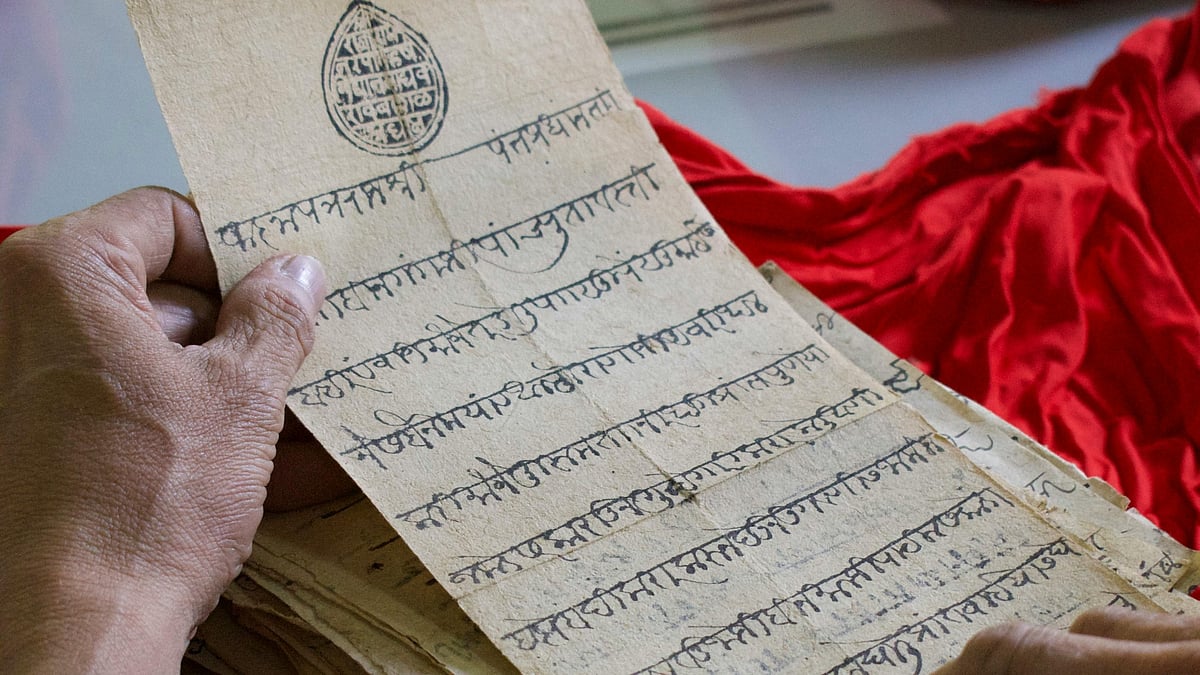Recently, a Reddit user’s frustration over Sanskrit being taught in schools has ignited a heated debate online, with many questioning the language’s relevance in modern education.
In a post titled “Why in the world is Sanskrit still being taught in schools?”, the user argued that Sanskrit, no longer spoken in daily life, is an unnecessary burden for students. “No one speaks Sanskrit any more. It’s basically an extinct language at this point,” they wrote.
While acknowledging the language’s historical and cultural significance, the author questioned its mandatory status in many schools. “Hours and hours are wasted on Sanskrit when the teachers themselves can’t speak it fluently. Even if they could, what of it? What purpose does it serve?”
The user further criticised the way Sanskrit is taught, calling it an exercise in rote memorisation rather than true learning. “I learnt Sanskrit for five years, but I can’t remember a single Sanskrit word,” they said, adding that most students forget what they studied after passing exams.
It’s indeed a pertinent question: Why in the world is Sanskrit still being taught in schools? Agreed, Sanskrit is a great language, but like Latin, it’s a moribund language if not completely dead. Today, it’s anything but a functional tongue. No one converses in it, just like no one speaks Latin in Europe. Linguists and philologists unanimously believe that a language survives because of its functional and conversational relevance. When no one uses a language in everyday life, its utility wanes, and it becomes a relic of the past, to be studied by researchers, linguists and experts in the sphere of archaic languages.
In these times of fervid nationalism and resurgent Hinduism, the Hindutva forces are trying to impose Sanskrit on young and reluctant students. Since our mythological works are mostly in Sanskrit, it (Sanskrit) is being viewed as India’s religious language spoken by the gods of Hinduism (Dev bhasha in Sanskrit). This is a flawed perception, as faulty as Muslims believing that Arabic is spoken in paradise because Al-Furqaan (the Quran) is written in Arabic.
We’ve an exaggerated and over-respectful attitude towards Sanskrit. All languages must be respected, but none should be forced upon those who’re not disposed to learn it. A widespread myth among the Indians that Sanskrit is the most scientific language and is tailor-made for computers and all software has made its study compulsory at the school level.
Sanskrit, like any other classical language, is rich but not flawless. No language is perfect. You can’t find a single language, old or modern, accommodating all the sounds. Does Sanskrit have typical guttural and fricative sounds of qaaf, ain, ghain, and zuad of Arabic and Persian? Likewise, the Arabic alphabet doesn’t have a letter specifically for the “p” sound; the closest sound in Arabic would be “b”, so many Arabic speakers might pronounce a “p” as a “b” when speaking English.
Our nebulous understanding of Sanskrit as a spoken language is also responsible for its unnecessary perpetuation at the school level. This needs elaboration. When B.R. Chopra’s Mahabharat became famous thirty-seven years ago, people started thinking that it was Sanskrit because the serial’s Hindi was overloaded with Sanskrit words. Sorry, it was not Sanskrit, but Sanskritnishth (Sanskrit-based) Hindi. This erroneous notion still persists.
Teachers teaching Sanskrit at schools teach it (Sanskrit) in Hindi with a generous sprinkling of Sanskrit words because they themselves don’t know how to speak it correctly. Students opt for it because it’s a “scoring” subject. They get 100 out of 100 in Sanskrit. This is humiliating and an unwitting insult to a great language. Those who’re genuinely interested in learning Sanskrit must be encouraged, but those who’ve no interest in it can be exempted from learning it. One ought to have a feel for a language. Otherwise also, those who teach Sanskrit are themselves in need of learning it anew. Sanskrit also needs to shed its condescendingly classist and Brahminical image. Remember, it’s just a language.
Lastly, there’s a misconception in India that all Indian languages originated from Sanskrit. We must disabuse ourselves of this deep-seated wrong belief. What about Tamil? From the syntax and context angles, Tamil is vastly different from Sanskrit. It’s also older than Sanskrit. While both Tamil and Sanskrit are ancient languages with rich histories, Tamil is generally considered to have older documented evidence and roots than Sanskrit, with Tamil epigraphy dating back to 300 BCE, while the earliest Sanskrit epigraphy is dated to 100 AD. Scholars of Jainism knowing Prakrit have serious reservations regarding the claim that Prakrit is a tributary of Sanskrit. They believe, with incontrovertible pieces of evidence and references, that Prakrit birthed Sanskrit and not the other way around. There’s no end to it. It’s, therefore, time we studied languages from a purely linguistic point of view and also with genuine interest and intention. Politicisation of any tongue will not lead us anywhere.
Sumit Paul is a regular contributor to the world’s premier publications and portals in several languages
